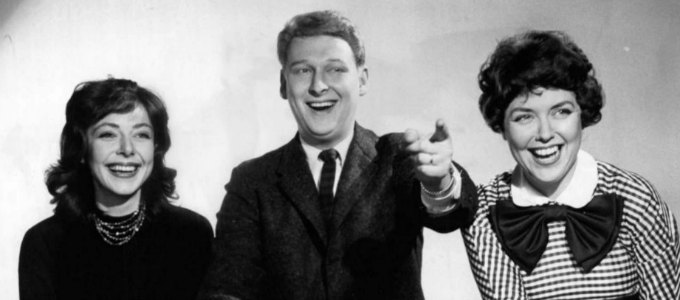
As film fans mourn the death of director and comedian Mike Nichols, editor Kellye Whitney looks at his behind-the-scenes ability to bring diversity onto the screen and into daily conversation.
by Kellye Whitney
November 21, 2014
Mike Nichols with Elaine May and Dorothy Louden on 1959's "Laugh Line." Nichols died this week at 83. (Photo courtesy of Wikimedia Commons)
All you cinema buffs are likely aware that Oscar-winning director Mike Nichols died this week. He was 83.
He’s known for films like “The Graduate,” “Who’s Afraid of Virginia Woolf,” “Silkwood” or the more recent “Charlie Wilson’s War.” But I think he may also have been a quiet advocate for diversity.
In a January 2013 interview for Vanity Fair,his interviewer and peer Elaine May asked, “What have you learned?” The following transcript of his response suggests he learned that being different can lead to a heightened intuition into others motives.
Nichols: “I’ve learned that many of the worst things lead to the best things, that no great thing is achieved without a couple of bad, bad things on the way to them, and that the bad things that happen to you bring, in some cases, the good things. For instance, if you grow up odd and — what is it when you’re left out? You’re not an extrovert —”
May: “Introvert?”
Nichols: “No, when you grow up —”
May: “Peculiar?”
Nichols: “Peculiar. Different. The degree to which you’re peculiar and different is the degree to which you must learn to hear people thinking. Just in self-defense you have to learn, where is their kindness? Where is their danger? Where is their generosity? If you survive, because you’ve gotten lucky — and there’s no other reason ever to survive except luck — you will find that the ability to hear people thinking is incredibly useful, especially in the theater.”
I can’t think of any sentiment more necessary for minority survival in the workplace. Those of us who are different have to be more intuitive. We can’t always take things at face value because of unconscious bias, which is always present, bubbling away under the surface of nearly every interaction, influencing behavior, thought and speech.
Nichols will be remembered for directing films that resonate with large audiences and for helping to create and popularize strong female characters. But there are others not so famous who do what they can to promote diversity — or as he said, difference — without red carpet spotlights and fanfare.
Like Nichols, these silent advocates help to promote the diversity and inclusion agenda, and keep it alive amidst the often raucous dialogue we’re exposed to from many sources each day.
The direct approach — this isn’t right because of X; we need to act now to make a difference — often doesn’t work. It’s unnerving, even upsetting to have wrongs or differences pointed out, and it frequently inspires defensiveness and instinctive rebuttal rather than thoughtful action and change.
So, hats off to the quiet diversity and inclusion advocates, leaders in their respective industries like Nichols who show us, whether on screen or off, that difference can be engaging, realistic and actionable.



